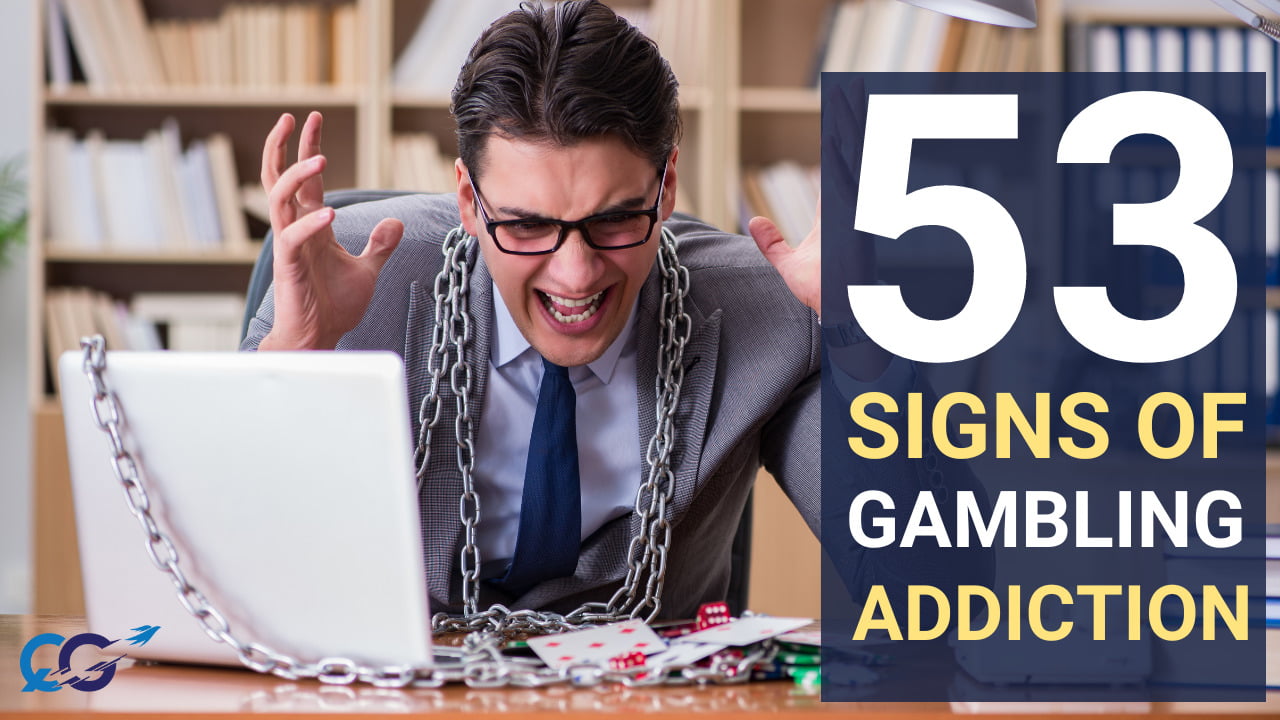The statistics for the US show similar numbers. (With some quick math, the number of problem gamblers to about 10 million Americans!) On QuitGamble.com, we believe that number will double within the next five years.
So, what are the signs of gambling addiction? What should you be aware of, both in yourself and for the people around you?
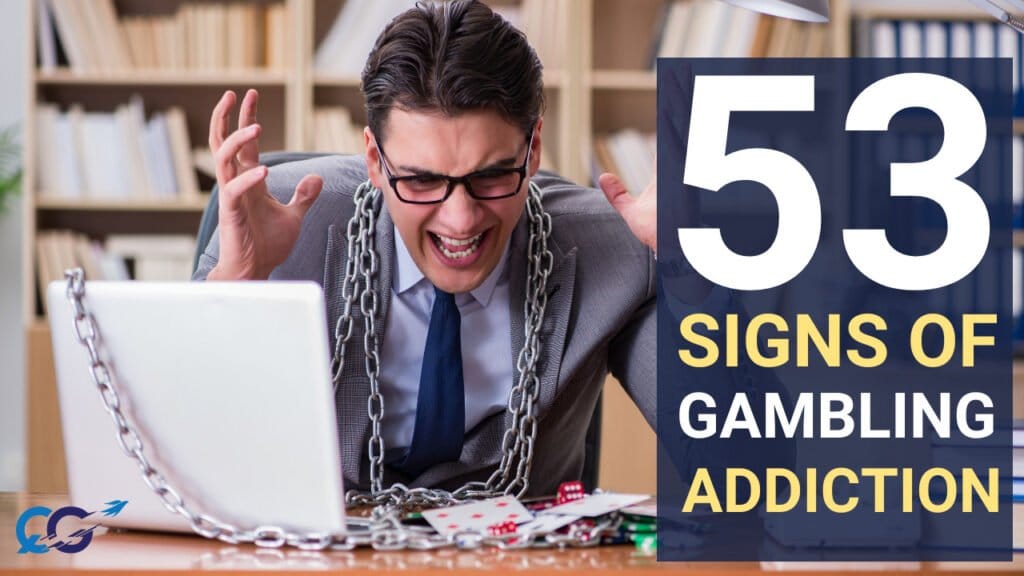
Some common symptoms of gambling addiction include mood swings, lousy sleep, and playing for more than one can afford. You’ve probably heard them before, and yes, we added them to our list too. BUT there are more significant signs to look for. To make it easier to read, we’ve structured the symptoms of gambling addiction into the following categories.
- Most Crucial
- Money – What the gambling industry wants you to focus on
- Feelings
- When stopping gambling
- Common beliefs
- Behavior towards others
- Typical characteristics
Before we begin. Here is how we define gambling addiction:
“If a person experiencing pain feels the urge to gamble, then he/she is a gambling addict.“
The following list of signs of a gambling addiction is based on research and five years of studying and working with gambling addicts.
The most crucial symptoms of gambling addiction
Please stop gambling altogether if you recognize the following ten signs of a gambling addiction. We’ll do our best to help you. These signs are often overlooked, but we want you to be wary of them if you play casino, sports betting, or any other gambling.
1. Continue playing even if you win
What happens when you win? Do you continue gambling, or do you stop? It feels great to win because you get more money to play with. It means you can continue to play longer.
Suppose you continue to play until you have no money left. If you do that every time, it’s probably the most critical sign of gambling addiction (Cheng, 2022). If you keep playing until all the money is gone, gambling isn’t about winning anymore. It’s about something else!
2. Feeling desperate – Don’t understand why you’re gambling
Most gambling addicts know that gambling destroys their lives. But they keep playing anyway. Can you relate to that? They keep playing because gambling is doing something for them. That’s the reason it’s so hard to stop gambling!
To answer the question of how to stop gambling addiction, you need to understand what gambling is doing for you. Then, you can work on the underlying causes of the addiction, not just try to stay away from it.
We have talked with 100s of problem gamblers, and, commonly, they don’t know why they gamble. They think gambling is about winning, but we’re yet to meet the gambling addict who gambles to win money.
3. Using gambling to escape (without knowing)
Gambling has become a habit, something the person does automatically as a response to a trigger. Perhaps the trigger is loneliness, boredom, or stress. Do you know what your gambling triggers are? Do you gamble without really understanding why you do it?
For many, gambling becomes an escape (Ashrafioun, 2012). For a person who feels lonely, gambling can become a way to forget about loneliness.
4. Gambling has started causing pain by itself
The negative aspects of gambling have become larger than the positive side. For instance, mounting debt causes anxiety about the future, or hiding/lying about gambling causes regrets, worries, and impaired sleep.
When gambling both causes pain and works as an escape from the pain, the gambling behavior can quickly escalate into a negative spiral. One thing triggers the other.
5. Higher bets increase to keep the same feeling
One sign that gambling has started to cause pain is that the bets increase. Suddenly, the person needs more dopamine, excitement, and higher stakes for gambling to have the same effect.
There is also a physiological explanation for this phenomenon: The dopamine receptors in the brain get desensitized from excessive gambling (Bullock, 2012), and the brain needs more dopamine to get the same effect.
6. You get an urge to gamble as soon as you’re in a situation you feel lonely or bored.
In our sign-up form, we ask users about their gambling habits. Based on 800 responses, boredom, and loneliness are the two most common triggers for gambling. Remember the last few times you gambled; in what situation did you get the urge to gamble? Were you alone, or did you feel bored? If so, you likely subconsciously gambled to escape those feelings.
7. Describing the moment of gambling as a moment of peace
What happens when you gamble? What do you think of? How do you feel? And perhaps most interestingly, what do you not feel or think when you’re gambling? Many of our members have described the moment they gamble as a moment of peace. For a moment, they don’t think of anything. The game completely absorbs them. We believe that if people experience gambling as a moment of peace, it’s a warning sign of gambling addiction. The addiction might not be fully developed yet, but there is a risk it will.
8. Realized, you use gambling as an escape, but not from what
Understanding if gambling works as an escape for you is very significant. The bad news is that it’s a sign of gambling addiction. The good news is that you’ve already taken a significant step towards overcoming gambling addiction. Even if you don’t know what gambling does for you, understanding that gambling does something is vital. If you can relate to this sign, the next step is determining what gambling does for you. You can use two tools for that:
- You are reflecting on the questions: What happens when you gamble? What do you think of? What do you feel? And perhaps most interestingly, what do you not feel or think?
- Doing the Happiness Test
9. Being depressed and gambling
Another warning sign of gamble addiction is if you gamble when you are depressed, thinking of depression, or feeling low. There is a scientific link between depression and gambling addiction (Krause 2018). Gambling will likely have a more substantial psychological effect if the person is depressed, which makes the person more sensitive to developing an addiction. It’s still unclear if depression leads to gambling addiction or if gambling addiction is a cause of depression, though. We believe it happens both ways.
10. You’re drinking while gambling
Both alcohol and gambling release dopamine in the brain. One sign of gambling addiction we mentioned above was higher bets. Alcohol can have the same effect (Martinac 2018). If the brain craves more dopamine than gambling can produce, people often add alcohol as well. The need for both gambling and drinking is another symptom of gambling addiction.
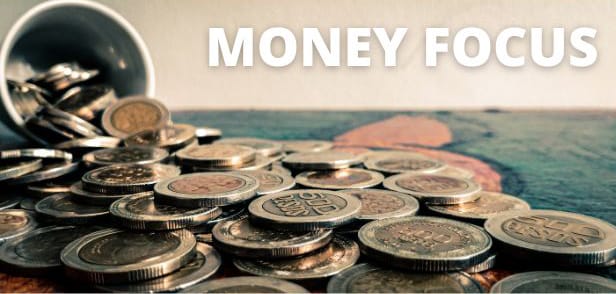
Money – What the gambling industry wants to focus on
We have read hundreds of responsible gambling, safer gambling, gambling harm, problem gambling, and gambling addiction pages in the gambling industry. The common theme: “You’re safe, as long as you don’t gamble for more than you can afford.”
That would mean that a rich person can gamble for many years before he has lost enough to be considered a gambling addict. We strongly disagree! According to Celeb Mix celebrities like Tiger Woods, Ben Affleck, Charlie Sheen, and Michael Phelps have all struggled with gambling. Rich people can be gambling addicts, too. However, the following seven gambling addiction symptoms are probably more relevant for people with less money.
11. Gamble for more money than you can afford to lose
Do you know how much your gambling costs you? If you’re gambling for more money than you would spend on, for example, entertainment, you need to be extra careful. Spending more money on gambling than you can afford indicates gambling problem signs. (Criteria in DSM5)
12. Borrow money to finance gambling
If you’ve ever taken a gambling addiction test (except the Happiness test), we’re confident you’ve been asked about borrowing money for gambling. It’s a good question because a “YES” would indicate that gambling negatively affects a person’s finances.
Borrowing money also includes situations in which the person has to borrow money to pay bills, loans, or food as a direct consequence of losing money in the casino. This is a common sign of problem gambling. If you live close to a gambler, please read the guide on protecting yourself from a gambling partner.
13. Problem paying rent or bills
Perhaps you haven’t borrowed money to finance your gambling, but have you ever had problems paying rent or wondered how you could put food on the table after you’ve spent time gambling? Of 2000+ answers to the Happiness Test, 25% answered that they worry about putting food on the table. It indicates that problems paying rent and bills can be a symptom of compulsive gambling.
14. Getting payment reminders in the mail
Perhaps you found a way to skip a payment or two to manage the finances for the month. Cutting payments isn’t a viable solution, and it also counts as a sign of compulsive gambling. It’s also one of the signs of a gambler we mention for people close to addicts. We ask them to check for payment reminders in the mail.
If you struggle with your finances because of gambling, it’s one of the signs of a gambling problem. It’s okay to ask for help!
15. Steal money to enable gambling
Gambling addiction can cause people to do unimaginable things, even commit crimes to get hold of money to gamble with. Here are a few examples:
- Write cheques with no cover.
- “Borrow money” with no intention to pay it back.
- Take money from someone else’s bank account.
- Stealing things to sell
- Commit fraud
In a study with GA members, 57% said they had stolen money to finance their gambling (Stewart 1988). Using or trying to use someone else’s money to gamble is a red flag for gambling addiction. The addiction is getting out of hand, and manic, pathological gambling behavior is developing. Criminal actions can have serious long-term effects. If you’ve done anything like this, it’s time to seek help.
16. Gambling to cover debt
Another question we ask our members is why they gamble. About 80% of our new members have problems with debt, and about 10% answer that a main drive for gambling is to cover gambling debt. They try to win back what they’ve lost or solve their financial situation with a big win.
The fact that it’s possible to win back money makes gambling addiction tricky. You can’t solve an alcohol problem by drinking more. But the microscopic chance of solving one’s financial issues is often enough for a compulsive gambler to “justify” continuing gambling.
In our experience from talking with hundreds of gambling addicts, gambling isn’t about money anymore. It doesn’t matter if the person wins or loses. A compulsive gambler will continue to gamble no matter what. Hence, it’s impossible to cover gambling losses with a big win.
Can you relate to gambling to win or pay back your debt? If so, be aware it’s a sign of problematic gambling.
17. Chasing old losses
Trying to win back is perhaps the most common indicator of gambling addiction. DSM5 Criteria – Desperate to recover what was lost only causes more profound problems. The desperation to recover what was lost only causes more profound problems.
This phenomenon exists not only in gambling. In the business world, it’s called sunk costs. It’s money a company already has invested in a project. The more money invested, the more likely the company will continue investing even if it’s a “dead project .”It’s another equally bad way of trying to chase losses.
Have you returned to the casino the next day to win back what you lost?
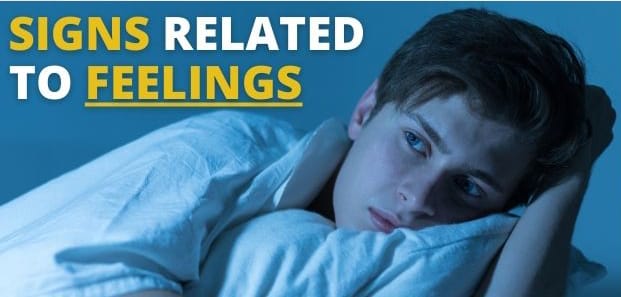
Feelings as gambling addiction symptoms
On QuitGamble.com, we talk a lot about feelings and needs. Our emotions directly reflect how well our needs are met in a situation. In the list below, you’ll find some familiar feelings that may indicate something is risky in your gambling behavior.
18. Feeling restless when you’re not gambling
Gambling addicts often become restless when they don’t gamble. They want to return to the game and often forget what to do or what they like outside gambling. Casino addiction pushes everything else away. If you often gamble and feel restless at times you don’t gamble, it’s a common symptom of gambling addiction you find in most lists.
19. Developing mood swings
Gambling can also affect mood. Many gamblers develop mood swings. All emotions in the game affect life outside—losses create frustration, anger, and anxiety. The constant dopamine rushes from the games also make life outside the game less exciting because few things produce as much dopamine as gambling. The dopamine unbalance adds further to the mood swings.
20. Sleeping poorly due to anxiety and restlessness
Many compulsive gamblers sleep badly. Restlessness, stress, and anxiety create cortisol, which alerts the body. The brain is in a constant flight fight mood with thoughts about gambling, how to get more money to gamble with, and worries about the future.
21. Regret that you gambled afterward
A sign of a gambling problem is feeling regret, self-hatred, frustration, and anger after gambling. “How could I be so stupid? How could I do…?” It can be extra noticeable if you try to stop gambling and relapse.
Regretting gambling would most likely mean that we gambled too much and lost control. The article ”A Gambler’s Curse” explains this more.
22. Remember and chase the feeling of winning
The memory of the first win can remain in a person’s life forever. Problem gamblers often describe chasing that feeling as wanting to experience it over and over. This symptom is based on lived experience from interviews and user comments on QuitGamble.com.
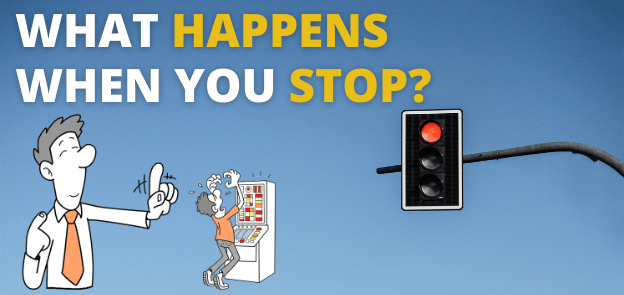
When stopping gambling – Withdraw Symptoms
One of the most evident indications of a problem is what happens when we try to stop it. Here are a few gambling addiction symptoms related to stopping gambling.
23. Tried to stop gambling but failed
Have you ever tried to stop gambling? What happened? Like the artist Passenger signs in Let Her Go:
Only miss the sun when it starts to snow
Only know you love her when you let her go
Only know you’ve been high when you’re feeling low
Only hate the road when you’re missing home
Sometimes, we must miss something to understand what it means to us. It’s the same when it comes to stopping gambling. When we try to overcome addiction, we first start understanding what it does for us. If you’ve tried to stop gambling but failed, it was probably because gambling did something for you that you weren’t aware of. It’s also a sign that gambling might be a problem for you (NSU).
24. Feeling empty when you can’t gamble
Some gambling addicts feel empty when they don’t gamble. Can you relate to that? How does it feel if you go without gambling for a few days? Do you miss it, or is it like it was never there?
It’s easy to explain this symptom of gambling addiction. If you gambled a lot, it’ll take time before you fill that time with something else.
25. Getting withdrawal symptoms when you don’t gamble
What happened when you tried to stop gambling? Did you experience any signs and symptoms of gambling withdrawal? According to a study published in 2015, 30-40% of high-frequency gamblers showed significant disturbance in restlessness, depressed mood, poor concentration and anxiety, and poor sleep.
Signs of gambling addiction beliefs
Our beliefs are an essential part of who we are. Sometimes, they are helpful. Sometimes, they might put you at unnecessary risk. Below is a list of beliefs that might suggest gambling problem signs or symptoms of gambling addiction.
26. Believe you gamble to win – Change your life
Most start gambling as entertainment, and the thoughts of winning and what to do with the money are thrilling. But keeping that thought while continuing to gamble over time can be traitorous. Most forms of gambling will not make gamblers rich, only the casino. Our article about the addiction curve says people are out of thin ice if they gamble to win money.
Gambling with the belief that it can change one’s life is dangerous. Many of our members share this dream: to win big and change their lives. In the end, they realized they needed to stop gambling.
27. Believe you’re different – others can have problems with gambling
The thought that others can struggle with gambling problem signs, but I’m different, is hazardous. Everyone is unique, but we’re still similar in many aspects. Dealing with gambling addiction isn’t anything some people are immune from.
We shouldn’t compare ourselves to others, but sometimes it’s good to be humble and open to the possibility that bad things can happen to us, too.
28. Believe you can stop gambling whenever you want
Mark Twain once said: It’s easy to stop smoking. I’ve done it a hundred times. If you have that belief, test it right away. If you’re right, great! If not, then let’s deal with the problem head-on. Don’t carry that belief with you. Challenge it directly!
29. Don’t believe gambling is a problem
One difficulty with gambling problems is that it takes time to realize and accept one has a problem. Often, people lie to other people about their gambling and lie to themselves, too. It’s okay if you don’t think gambling is a problem. Perhaps it isn’t. Maybe you need some time to figure it out.
30. Believe you can gamble “a little bit”
Has that ever worked? Thinking we can do something “just a bit” is dangerous. If you have it, challenge it and get rid of it. It’s better to do it once than to keep that thought. You’ve probably heard that an alcoholic can’t take one beer. It’s the same with a gambler. The belief indicates not understanding or accepting the complete gambling problem. There is no responsible gambling for a gambling addict. If you know you struggle to control your gambling, please start the process to stop gambling altogether.
31. Believe that skills and winning go hand in hand
In most gambling, there are no skills involved. It’s only luck! It doesn’t mean the brain doesn’t think about it as a skill, though. But if you believe that you only lack the proper skills or have been unlucky so far. These thoughts are signs of gambling addiction. There is no magic way of playing slot machines, no sequence that occurs more often in lotto, or a way to beat the house in roulette.

Symptoms of Gambling addiction in behavior toward others
All addictions image the addicts’ relationships with people around them. Below is a list of symptoms to look for: if you think you might have a problem, and if you have someone close to you you suspect gambles too much.
32. Lying and trying to hide your gambling
Have you ever lied about your gambling habits? Do you hide what you’re doing or are not proud of it? Addicts of all addictions lie and deny what they do (DSM 5 Criteria).
Pathological gamblers may even lie to themselves to carry on gambling. The person is in so much pain that they cannot tell anything to continue. They lie about how much they gamble, how much they lose, why they gamble, how long they have gambled, etc.
33. Coming up with excuses to gamble
Have you ever used an excuse to get away from something to gamble instead? The sign is based on witnesses of lived experience with gambling addiction. We had one member who wrote:
“I once was on a date. It didn’t go very well. Instead, I started daydreaming about gambling – How today would be my day. When I hadn’t said anything for a few minutes, the guy asked me if I was okay. I lied; I said I felt sick and went to the bathroom just next to our table. In there, I made some fake but convincing barfing sounds. Then I returned to the table 5 min later. The guy was gone, and I headed towards the casino.“
What’s the craziest thing you’ve done?
34. Isolate yourself from friends and family
Recognizing gambling addiction signs is crucial as one of the most common indicators is when an individual prioritizes gambling over spending time with loved ones. Those who suffer from gambling addiction tend to isolate themselves from friends and family, causing the gambler and their loved ones to suffer (1800Gambler). Even if family members are unaware of the gambling addiction signs, they can still be impacted by the gambler’s behavior.
35. Late with reports and tasks and struggle to keep up
When gambling takes up more time. The gambling addict has difficulty meeting work deadlines or coming on time. Gambling late at night can also affect productivity at work. It’s a common sign you find in most lists of signs of gambling problems.
36. Get defensive if anybody confronts you
How do you respond when someone asks about your gambling? Are you open to discussing it, or do you immediately become defensive? Reacting with denial or defensiveness may be an indication of gambling addiction.
Sign based on the lived experience of gambling harm by gamblers and affected others. Many affected others we’ve talked to have told us how their gambling partners have reacted when being confronted about their gambling. Users on QuitGamble.com have also said that they have denied having gambling problems many times.
37. Gambling harms your close relationships
When gambling starts negatively impacting the gambler’s relationships, it’s a sign of a gambling problem (DSM5 Criteria). Even if they don’t know about gambling, the secrecy, excuses, and lies create a certain feeling. Relationships need time, nourishment, and presence. All these ingredients are limited when someone spends most of the time gambling.
Typical characteristics of a gambling addict
Below you will find a list of characteristics that gambling addicts often have. Can you relate to any of them?
38. Thinking of gambling, even when you’re not playing
A warning sign for your gambling habits to keep an eye out for is if you start thinking of gambling when you’re not gambling (DSM5 Criteria). Perhaps planning the next session, thinking about how to make time, and what you should bet on. It’s a sign that gambling is growing more important for you and an early indicator of gambling addiction.
39. Gambling takes a big part of your time
How often do you gamble? How much time do you spend gambling? How much time did you spend six months ago? Is the amount growing? Many gambling addiction programs have time as an important risk factor for gambling addiction.
About 5% of Swedes gamble daily, and 3-4% of the population has some level of casino addiction. This 3 – 4 % of the population is most likely represented in the group who plays daily.
40. Gamble on things you don’t even remember
Do you remember the bets and gambling sessions you had last week? Does it happen that you forgot you even made a bet on things? It is a clear sign that you’re not gambling for entertainment anymore, that you may develop a gambling addiction disorder and lose control.
41. Gamble on anything you can gamble on
A study in Michigan found that one thing that set compulsive gamblers apart from recreational gamblers was the number of types of things they gambled on. Compulsive gamblers often gambled on 6+ different things (IDSH 2021).
Do you struggle not gambling on things, or do you see opportunities everywhere? Gambling on anything is a predictor of gambling disorder and is essential to watch out for when dealing with compulsive gambling issues.
42. Keep playing even if gambling isn’t fun anymore
For a pathological gambler, gambling isn’t fun anymore. It’s a compulsion. When gamblers come to us, some begin talking about the excitement of gambling, but after a few minutes of talking, that perception often changes. They believe they gamble because it’s fun and exciting, but they think closely about what happens when they gamble. They often describe numbness. It’s another way to express that gambling works as an escape.
Others say gambling was fun initially, but then gambling becomes a problem. When the person has a slot addiction or casino addiction, the gambler is driven by a desperation to win back what they have lost.
43. Your priorities have shifted
Things that were fun in the past have lost their appeal (DSM5 Criteria). What did you love doing 5 years ago? What did you spend the most time with?
- Hang out with friends?
- Play golf?
- Take walks in the park?
- Cooking fancy dinners?
- Play with your kids?
- Exercise in the gym?
Have any of these priorities changed for you? Has gambling gotten a higher priority?
44. Won the first time you gambled
What happened the first time you gambled? Did you win? Countless gambling addicts have witnessed that first time, that first win. Naturally, not everyone who wins the first time will develop a gambling problem. But if you did win, be extra careful.
Listen to a podcast like ALL IN The Addicted Gambler’s Podcast, and you’ll often hear gamblers tell how they won the first time.
45. Take big risks – “Tilt”
Do you gamble recklessly? In poker, this behavior is called “tilt .”It means we do something we know is wrong, but we just can’t help it.
Playing recklessly indicates that the person doesn’t have control over their gambling – A warning sign of compulsive gambling based on lived experience and witness accounts from desperate gambling addicts in our community.
46. Not acting rationally – Compulsive behavior
Do you need to defend your behavior to yourself? Do you do things you thought you’d never do to finance your gambling? Lying, manipulating, hiding, committing crimes, or gambling on things that don’t make sense at all?
A progressive disorder characterized by a continuous or periodic loss of control over gambling; a preoccupation with gambling and with obtaining money with which to gamble; irrational thinking; and a continuation of the behavior despite adverse consequences (Jazaeri 2012).
We talked about tilting in the previous symptoms of gambling addiction. However, the behavior can also spill over to other non-addiction-related areas of life. Are you more impulsive?
47. Poor self-esteem and self-confidence
Poor self-esteem and self-confidence are risk factors for gambling addiction (Choi 2021). Gambling releases dopamine in the brain, making us feel better about ourselves (Berridge 2007). Hence, a person with low self-esteem and self-confidence would react strongly to gambling.
Do you have good self-confidence? How about your self-esteem?
48. Lost connection to “reality.”
Can you feel like you’re living in a bubble? Or that other people don’t understand you? Do you see the world the same way today as you did in the past? When you wake up in the morning, do you think about what this day will bring, or what are your first thoughts about gambling? The symptom of gambling problems is based on interviews and accounts of gambling addicts’ lived experiences on our platform.
49. Getting more impulsive than before
Do you feel more impulsive than you did before? Do you base your decision on facts or quickly assess a situation with your gut? Getting more impulsive is a sign that gambling is getting more serious.
50. Can’t differ between a real win and a false win
Our article “Can you win” discusses how slot machines work and how they are designed to create slot addiction. One feature slots use is fake wins. Let’s say you bet $10. After a few seconds, the slot machine screams: “WIN – You won $5!”. Everything on the screen suggests you won. But, in reality, you lost $5.
If a person can’t see that, it’s a warning sign of irrational behavior that could lead to a gambling problem. Understanding how the games work is essential to protect yourself from getting into difficulties. The game developers use false wins to get you to play longer.
51. Difficulty answering the question: What do you enjoy doing?
When someone gets obsessed with gambling, everything else in life gets blurred. One way to check if this applies to you is by asking yourself: “What do I enjoy doing?” Try to come up with 5-10 things unrelated to gambling. It could indicate that you’re gambling too much if it’s hard.
(Authors note: In my case, it was depression. A few years ago, I was depressed. When I asked myself, “What do I like doing?” I had three things on my list after 5 min. It took another 30 min to write down ten things. Give yourself some time and push it through. It’s an excellent exercise to check on yourself.)
52. Thinking of gambling as the salary comes into the bank account
It’s payday. What is the first thing you think of? Every casino knows the most revenue will come after people get their salaries. Do you plan on how you will gamble before you get your salary? Do you sit and wait for the money to get in? That would be a BIG WARNING of addiction to gambling. Then, we recommend looking for gambling addiction resources to help you regain control.
This symptom of gambling addiction is based on witness accounts by users in QuitGamble.com who tell about how they would start gambling as soon as there was money in their bank account.
53. Gambling on things you can’t even win
Some people gamble with real money on games even when there is no way of winning money. They spend money on these games without realizing they cannot get their money back. It indicates that gambling addiction has little to do with winning or money. It’s all about the escape and distraction it provides.
54. Having multiple gambling accounts online
According to a Swedish survey in 2021, problem gamblers often have multiple online casino accounts. The survey didn’t answer why problem gamblers have numerous accounts. Still, based on experience in the gambling industry, it’s expected that gamblers have more than one account to claim bonuses or test their luck at different casinos.
Summary:
We created this extensive list to share our experience from interviews and work with hundreds of gambling addicts. You can find some gambling signs on lists on other websites. But most of them, we haven’t seen anywhere else.
If you recognize yourself in any signs you have a gambling problem, we advise you to seek help. Gambling can be fun, but it can also be a pain in the ass: A pain that needs time and support to heal. We recommend you poke around on QuitGamble.com, read some guides, do the Happiness Test, and perhaps join the community.
For gambling addicts, gambling is doing something for them. Understanding what that is is the key to success in recovery. The list above could be used to understand better your gambling behavior and what gambling does for you.
Symptoms of Gambling Addiction Sources
Ashrafioun 2012 – Ashrafioun, L., & Rosenberg, H. (2012). Methods of assessing craving to gamble: A narrative review. Psychology of Addictive Behaviors, 26(3), 536–549. https://doi.org/10.1037/a0026367
Berridge 2007 – Berridge, K.C. The debate over dopamine’s role in reward: the case for incentive salience. Psychopharmacology 191, 391–431 (2007).
Bullock 2012 – Bullock SA, Potenza MN. Pathological Gambling: Neuropsychopharmacology and Treatment. Curr Psychopharmacol. 2012 Feb 1;1(1):10.2174/2211556011201010067. doi: 10.2174/2211556011201010067. PMID: 24349964; PMCID: PMC3860173.
Cheng 2022 – Chen Z, Doekemeijer RA, Noel X, Verbruggen F – Winning and losing in online gambling: Effects on within-session chasing. PLoS
ONE 17(8): e0273359
Choi 2021 – Choi, J.; Kim, K. The Relationship between Impulsiveness, Self-Esteem, Irrational Gambling Belief, and Problem Gambling Moderating Effects of Gender. Int. J. Environ. Res. Public Health 2021, 18, 5180.
DSM 5 Criteria – Diagnostic and Statistical Manual of Mental Disorders, Fifth Edition, Text Revision (DSM-5-TR) was published in 2022 APA
IDSH: 2021 Statewide Assessment of Gambling and Problem Gambling in Illinois
Jazaeri 2012 – Seyed Amir Jazaeri, Mohammad Hussain Bin Habil – Reviewing Two Types of Addiction − Pathological Gambling and Substance Use – Indian Journal of Psychological Medicine | Jan – Mar 2012 | Vol 34 | Issue 1
Krause 2018 – Krause K, Bischof A, Lewin S, Guertler D, Rumpf HJ, John U, Meyer C. Explaining the relation between pathological gambling and depression: Rumination as an underlying common cause. J Behav Addict. 2018 Jun 1;7(2):384-391. doi: 10.1556/2006.7.2018.38. Epub 2018 May 30. PMID: 29846083; PMCID: PMC6174589.
Lutri 2018 – Lutri, V.; Soldini, E.; Ronzitti, S.; Smith, N.; Clerici, M.; Blaszczynski, A.; Bowden-Jones, H. Impulsivity and gambling type among treatment-seeking disordered gamblers: An explorative study. J. Gambl. Stud. 2018, 34, 1341–1354.
Martinac 2019 – Marko Martinac, Dalibor Karlović, Dragan Babić, Chapter 54 – Alcohol and Gambling Addiction, Editor(s): Victor R. Preedy, Neuroscience of Alcohol, Academic Press, 2019, Pages 529-535, ISBN 9780128131251
Stewart (1988) – Stewart, R. M., & Brown, R. I. F. (1988). An outcome study of Gamblers Anonymous. British Journal of Psychiatry, 152, 284 – 288
